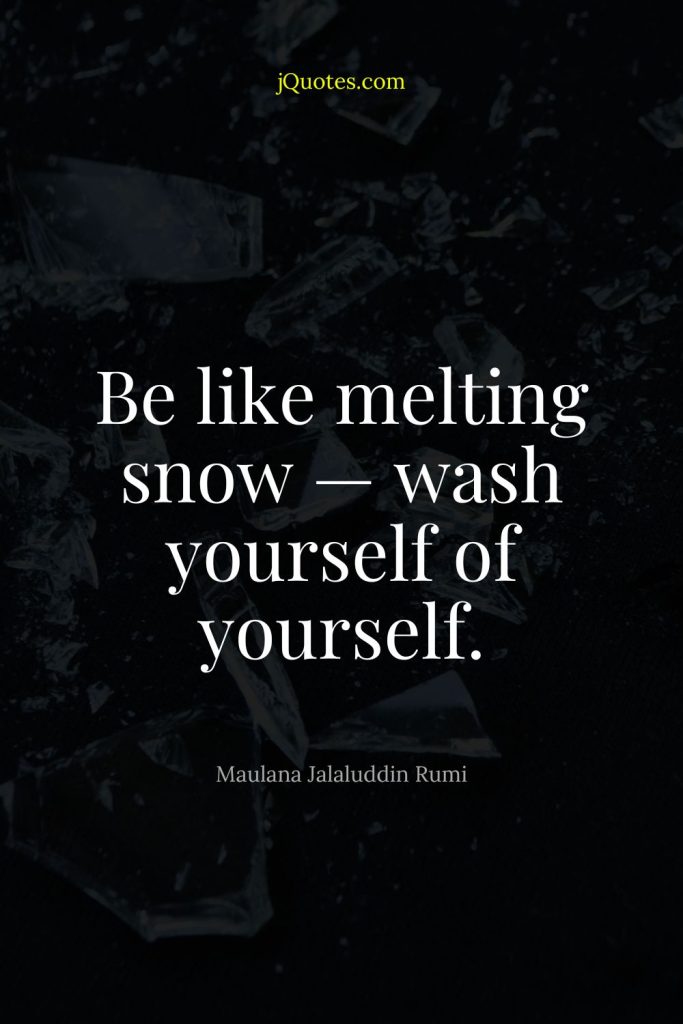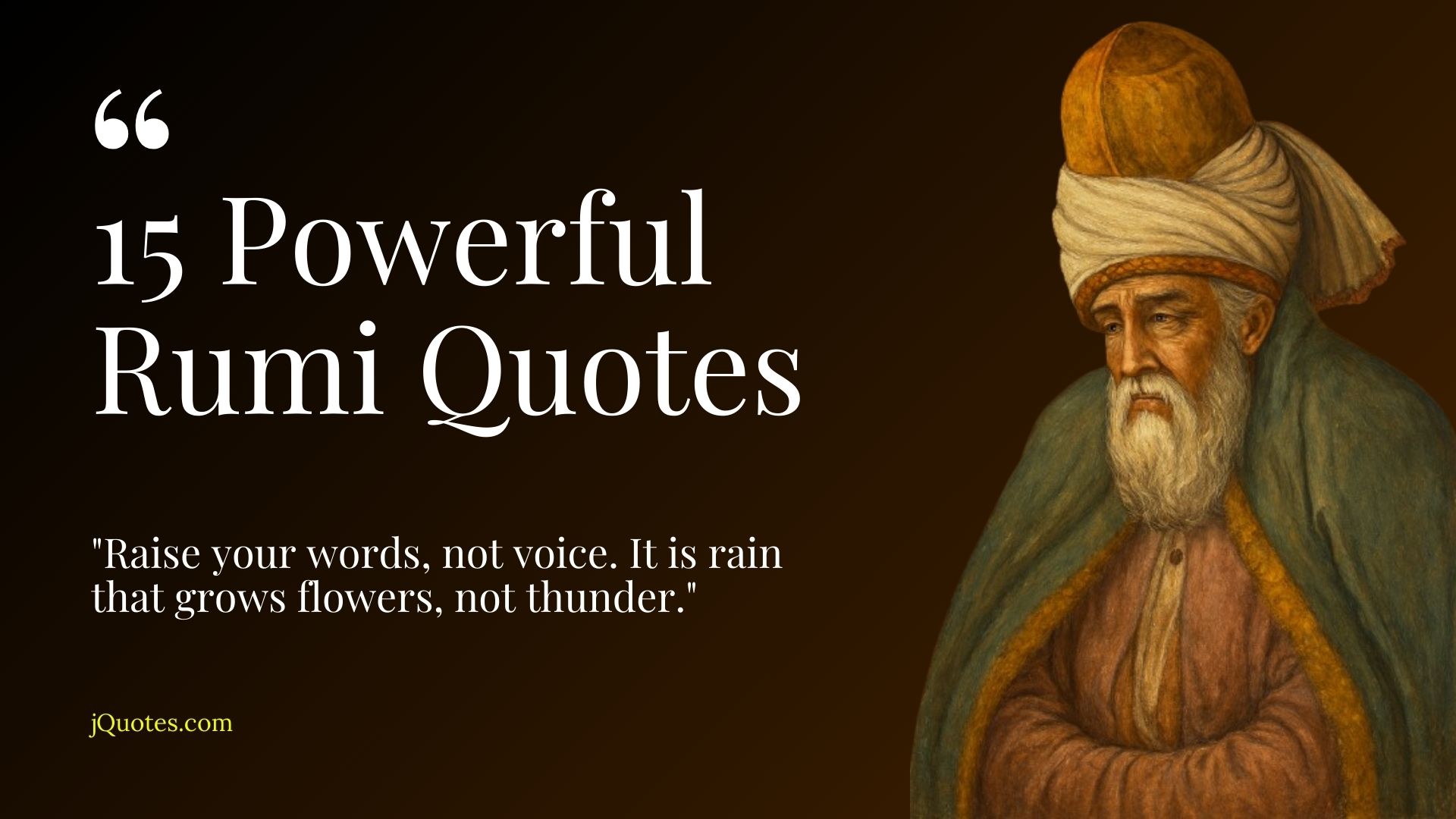Table of Contents
Introduction to Rumi’s Timeless Wisdom
Maulana Jalaluddin Rumi, often known simply as Rumi, stands as one of history’s most influential spiritual poets and Sufi mystics. Born in 1207 in what is now Afghanistan, this 13th-century Persian scholar produced works that transcend time, culture, and religious boundaries—touching the core of human experience with profound insights on love, spiritual awakening, and inner peace.
What makes Rumi’s poetry particularly remarkable is its continued relevance eight centuries after his death. In today’s fast-paced, often disconnected world, his words offer a sanctuary of wisdom and spiritual nourishment. His poetry speaks directly to the soul, addressing universal human experiences of longing, connection, and the search for meaning with extraordinary eloquence and depth.
Rumi’s collection of works includes the Masnavi, a six-volume poem often referred to as the “Persian Quran,” and the Divan-e Shams-e Tabrizi, containing over 40,000 verses of lyrical poetry. These texts continue to inspire millions worldwide, having been translated into countless languages and studied across diverse spiritual traditions.
In this carefully curated collection, we present 15 of Rumi’s most inspirational quotes to uplift your heart, awaken your spirit, and guide you toward greater self-awareness in 2025 and beyond.
15 Life-Changing Quotes by Maulana Rumi
1.”The wound is the place where the Light enters you.”

Pain is not the end—it’s often the beginning of transformation and healing. In this profound Sufi wisdom, Rumi reminds us that our darkest moments and deepest suffering can become gateways to personal growth, enlightenment, and spiritual awakening. This quote originated from Rumi’s experiences with loss and speaks to the universal human journey through suffering to illumination.
The wound is the place where the Light enters you.
Share this quote when comforting someone through difficult times or reflecting on how challenges led to personal growth.
2.”Don’t grieve. Anything you lose comes round in another form.”

Loss and change are inevitable parts of life, but Rumi suggests that energy never truly disappears from the universe. This spiritual perspective on impermanence inspires faith in life’s continuous cycle of renewal and the return of blessings in unexpected forms. The quote appears in Rumi’s Masnavi and reflects his belief in the cosmic balance of giving and receiving.
Don’t grieve. Anything you lose comes round in another form.
Perfect for sharing during transitions, after a loss, or when someone needs reassurance that better days will come.
3. “What you seek is seeking you.”
This short yet profound mystical teaching highlights the reciprocal connection between your deepest desires and your destiny. Rumi suggests a cosmic synchronicity—that our authentic yearnings are not random but connected to our purpose. Deeply rooted in Sufi philosophy, this quote speaks to the divine connection between the seeker and the sought.
What you seek is seeking you.
Use this inspirational quote when encouraging someone to pursue their dreams or when discussing manifestation and spiritual alignment.
4. “Let yourself be silently drawn by the strange pull of what you really love. It will not lead you astray.”
Your authentic passions and instincts serve as internal guidance systems. In this popular Rumi saying, the 13th-century poet encourages us to trust our inner calling rather than external expectations. This quote embodies the Sufi concept of following the heart’s wisdom and appears in Rumi’s collection “The Essential Rumi.”
Let yourself be silently drawn by the strange pull of what you really love. It will not lead you astray.
Share when discussing career changes, major life decisions, or encouraging someone to follow their true calling.
5. “You were born with wings, why prefer to crawl through life?”
This metaphorical Rumi quote serves as a powerful reminder of human potential and our spiritual capacity. Rumi challenges us to recognize our innate abilities and rise above self-limiting beliefs and societal constraints. This imagery appears frequently in his works, symbolizing the soul’s ability to transcend earthly limitations.
You were born with wings, why prefer to crawl through life?
Ideal for graduation speeches, motivational contexts, or when someone needs encouragement to embrace their full potential.
6. “The moment you accept what troubles you’ve been given, the door will open.”
Acceptance brings transformative clarity. Instead of resisting life’s challenges, Rumi advises embracing them—thereby opening the door to new understanding and possibilities. This wisdom reflects the Sufi practice of surrender (taslim) and appears in several translations of Rumi’s spiritual teachings on acceptance.
The moment you accept what troubles you’ve been given, the door will open.
Share during times of struggle, when facing seemingly insurmountable obstacles, or in discussions about mindfulness and acceptance.
7. “Stop acting so small. You are the universe in ecstatic motion.”
Rumi speaks directly to the divine essence within every soul. This cosmic perspective reminds us of our connection to something vastly greater than our individual concerns. Drawing from Sufi cosmology, this quote reflects the concept of wahdat al-wujud (unity of being) where each person contains the entirety of existence.
Stop acting so small. You are the universe in ecstatic motion.
Use when someone needs perspective on their self-worth or during discussions about human potential and spiritual identity.
8. “Raise your words, not voice. It is rain that grows flowers, not thunder.”
True power lies not in noise but in substance and wisdom. This eloquent metaphor teaches that gentle, thoughtful communication has greater impact than harshness or aggression. This quote demonstrates why Rumi’s wisdom on communication remains relevant in today’s often contentious discourse.
Raise your words, not voice. It is rain that grows flowers, not thunder.
Perfect for conflict resolution situations, parenting discussions, or leadership training contexts.
9. “Try not to resist the changes that come your way. Instead, let life live through you.”
Letting go of rigid control and surrendering to life’s natural flow often leads to deeper understanding and peace. This Rumi teaching embodies the Sufi concept of tawakal (trust in divine will) and acknowledges the wisdom that comes from acceptance rather than resistance.
Try not to resist the changes that come your way. Instead, let life live through you.
Share during major life transitions, career changes, or when discussing adaptability in an uncertain world.
10. “Be like a tree and let the dead leaves drop.”

This nature-inspired metaphor encourages releasing what no longer serves us. Just as trees naturally shed their leaves as seasons change, we too must release old patterns, relationships, and beliefs to create space for new growth. This quote appears in Rumi’s collection of nature metaphors that teach spiritual principles.
Be like a tree and let the dead leaves drop.
Use when discussing letting go, personal growth, forgiveness, or during seasonal transitions like New Year’s.
11. “Why do you stay in prison when the door is so wide open?”
This provocative question reminds us that many of our limitations are self-imposed constructs of the mind. Freedom often lies within our perspective and willingness to step beyond familiar confinement. This quote appears in Rumi’s teachings about the nature of spiritual freedom and self-liberation.
Why do you stay in prison when the door is so wide open?
Share when someone feels trapped by circumstances, needs perspective on their choices, or during discussions about mental freedom.
12. “Your task is not to seek for love, but merely to seek and find all the barriers within yourself that you have built against it.”
This profound spiritual teaching suggests that love’s essence is already within you—the real work involves removing the internal obstacles that block its expression. This quote reflects Rumi’s central teaching that divine love is our natural state when we remove the veils of ego and fear.
Your task is not to seek for love, but merely to seek and find all the barriers within yourself that you have built against it.
Perfect for discussions about self-awareness, relationship challenges, or spiritual growth journeys.
13. “Be like melting snow — wash yourself of yourself.”

This poetic call for ego dissolution and spiritual purification uses the beautiful metaphor of melting snow returning to its essential nature. In Sufi tradition, this concept of fana (annihilation of the self) represents a key stage in spiritual development where one transcends the limited self to experience divine reality.
Be like melting snow, wash yourself of yourself.
Share in contexts of spiritual practice, meditation guidance, or discussions about overcoming ego-based limitations.
14. “Respond to every call that excites your spirit.”
Life’s true direction is often found in the experiences and opportunities that spark your inner fire. This quote encourages following intuition and enthusiasm as reliable guides. In Sufi practice, this represents following the whispers of the soul (nafs) that lead toward divine purpose.
Respond to every call that excites your spirit.
Use when discussing career choices, creative inspiration, or following one’s authentic path.
15. “As you start to walk on the way, the way appears.”
This wisdom teaches that clarity often comes through action rather than contemplation alone. Sometimes the path isn’t fully visible until we take the first step in faith. This quote reflects the Sufi understanding of the spiritual journey as one that unfolds organically through committed practice rather than intellectual understanding alone.
As you start to walk on the way, the way appears.
Share when someone is hesitating to begin a new venture, facing uncertainty, or discussing spiritual practice.
The Historical Significance of Rumi’s Poetry
Rumi’s work emerged during the Golden Age of Persian poetry in the 13th century, a time of tremendous cultural and intellectual flourishing in the Islamic world. His meeting with the wandering dervish Shams of Tabriz in 1244 CE catalyzed his transformation from respected scholar to ecstatic poet. After Shams’ mysterious disappearance, Rumi poured his longing and spiritual insights into verse, creating some of history’s most enduring spiritual poetry.
What distinguishes Rumi’s work is its universal appeal across religious and cultural divides. Though firmly rooted in Islamic mysticism, his poetry speaks to fundamental human experiences of longing, love, and the search for meaning. This universality explains why, eight centuries later, Rumi remains one of the most widely read poets in America and throughout the world.
His work has influenced countless spiritual seekers, poets, and philosophers across generations and continues to offer profound guidance in our modern age of disconnection and materialism.
How to Apply Rumi’s Teachings in Modern Life
Rumi’s wisdom isn’t merely philosophical—it offers practical guidance for navigating life’s complexities. Here are five ways to incorporate these timeless teachings into your daily experience:
1. Practice Mindful Presence
Rumi often spoke of being fully present in each moment. Try dedicating 5-10 minutes daily to mindful awareness—simply noticing your breath, sensations, and surroundings without judgment. This practice aligns with Rumi’s emphasis on experiencing reality directly rather than through the filter of thoughts.
2. Embrace Difficulties as Teachers
When facing challenges, recall Rumi’s teaching that “the wound is where the light enters.” Consider journaling about what lessons or growth might be available in your current difficulties. This perspective shift can transform suffering into a pathway for deeper understanding.
3. Cultivate Universal Love
Rumi’s poetry consistently points to love as our essential nature and purpose. Practice extending compassion beyond your immediate circle—perhaps through volunteer work, random acts of kindness, or simply offering genuine attention to strangers you encounter.
4. Trust Your Inner Wisdom
In a world full of external opinions and expectations, Rumi encourages trusting your intuition. Before making important decisions, create quiet space to listen to your inner guidance, asking what truly resonates with your deepest values.
5. Release What No Longer Serves You
Regularly assess what emotional baggage, limiting beliefs, or relationships might be holding you back. As Rumi suggests, “be like a tree and let the dead leaves drop.” This might involve forgiveness practices, decluttering physical spaces, or consciously releasing outdated self-narratives.
When to Share These Inspirational Rumi Quotes
Rumi’s timeless wisdom can provide comfort, inspiration, and guidance in numerous life situations. Here are some perfect occasions to share these quotes:
- During major life transitions (graduations, career changes, relocations)
- In sympathy cards or condolence messages when words of comfort are needed
- For meditation or yoga class themes to inspire contemplative practice
- In wedding vows or anniversary celebrations (especially quotes about love)
- As journal prompts for self-reflection and personal growth
- During team-building exercises to inspire collaboration and purpose
- In therapeutic settings when processing grief, change, or personal challenges
- For social media inspiration that offers genuine depth beyond typical platitudes
- As graduation gifts paired with a beautiful journal
- During spiritual retreats or interfaith dialogues to find common ground
FAQ About Maulana Jalaluddin Rumi
Who was Maulana Jalaluddin Rumi?
Maulana Jalaluddin Rumi (1207-1273 CE) was a Persian poet, Islamic jurist, theologian, and Sufi mystic whose influence extends throughout Central Asia and beyond. Born in what is now Afghanistan, he spent most of his life in Konya (in present-day Turkey) where he wrote extensively and founded the Mevlevi Order, known for their “whirling dervish” meditation.
Why is Rumi still popular today?
Rumi’s continued popularity stems from his ability to address universal human experiences—love, longing, connection to the divine, and self-discovery—in language that transcends cultural and religious boundaries. His poetry speaks directly to the human condition in ways that remain relevant across centuries.
Did Rumi write in Persian or Arabic?
Rumi wrote primarily in Persian (Farsi), though he was also fluent in Arabic and occasionally included Arabic verses in his work. Most English translations come from his Persian writings, particularly the Masnavi and Divan-e Shams-e Tabrizi.
What is the Masnavi?
The Masnavi (also spelled Mathnawi) is Rumi’s masterpiece—a six-volume poem containing approximately 25,000 verses. It’s considered one of the most influential works of Sufism and Persian literature, often called “the Persian Quran” for its spiritual significance.
How has Rumi influenced modern spirituality?
Rumi’s emphasis on direct spiritual experience, universal love, and finding the divine within has significantly influenced contemporary mindfulness practices, interfaith dialogue, and non-denominational spirituality. His poetry offers spiritual wisdom without dogmatic requirements, making it accessible to seekers from diverse backgrounds.
Related Quote Collections
Expand your journey through wisdom and inspiration with these related collections on jQuotes.com:
- The best way to predict the future is to create it.
- Believe you can, and you’re halfway there. – Theodore Roosevelt
- Dream big and dare to fail. – Norman Vaughan
- Happiness depends upon ourselves. – Aristotle
- Success is not final, failure is not fatal: it is the courage to continue that counts. – Winston Churchill
Final Thoughts
Rumi’s words are more than just poetic expressions—they serve as a spiritual guide for anyone seeking truth, love, and transformation. These 15 inspirational quotes from Maulana Rumi offer daily reminders to live with purpose, embrace the divine within, and walk the path of self-discovery with courage and awareness.
Whether you’re navigating challenging transitions, seeking deeper spiritual connection, or simply in need of wisdom that touches the soul, let these timeless verses illuminate your path in 2025 and beyond. Rumi’s voice continues to echo across eight centuries because it speaks to something eternal within the human experience—our capacity for love, wonder, and spiritual awakening.
Did You Enjoy This Collection of Rumi Quotes?
Share your favorite Rumi quote and how it has impacted your life in the comments below!
And don’t forget to bookmark jQuotes.com for daily inspiration and the world’s most comprehensive collection of wisdom from across cultures and throughout history.







Leave a Reply